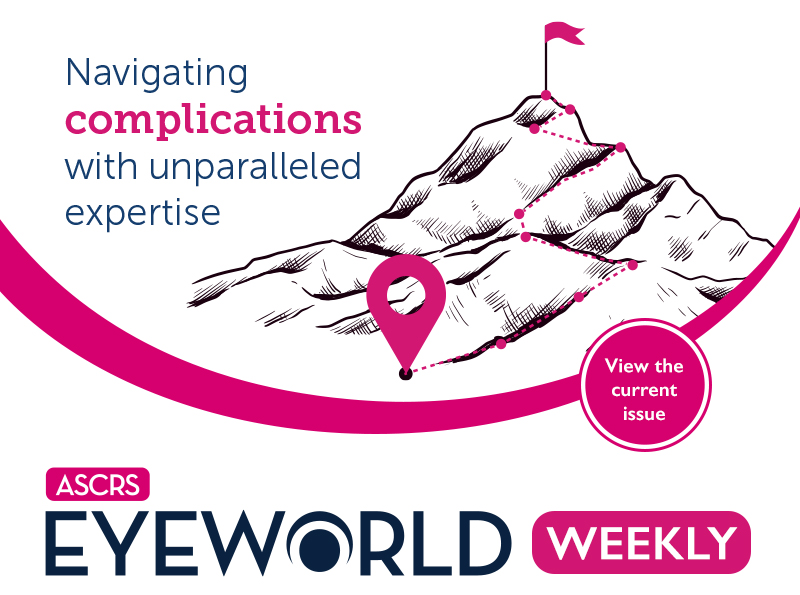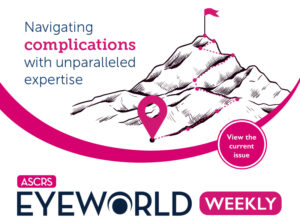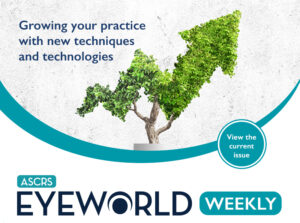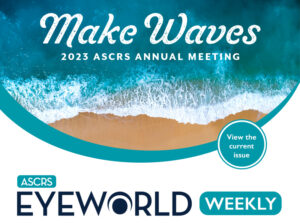
- FDA expands eye drop warning list
- Positive results in Phase 2a trial for new biodegradable sustained drug delivery implant
- Phase 2b study begins for investigational therapy for acute infectious conjunctivitis
- FDA approves additional treatment indication for bispecific antibody
- Enrollment complete for study evaluating femtosecond laser-created trabeculotomy
- Company to study personalized medicine for patients with wet AMD
- Enrollment complete for Phase 2b trial evaluating wet AMD therapy
- Pivotal trial for wet AMD therapy begins
- Survey evaluates female ophthalmologist experiences
- ASCRS news and events
November 3, 2023 • Volume 29, Number 44
FDA expands eye drop warning list
The FDA has continued to update the list of over-the-counter eye drops that it is advising consumers “immediately stop using” due to the potential risk for infection. As of this week, the list includes more than two dozen drops.
Positive results in Phase 2a trial for new biodegradable sustained drug delivery implant
PolyActiva announced positive results for its proprietary drug delivery platform. The company is developing PA5108 Ocular Implant for patients with mild to moderate glaucoma. In an ongoing Phase 2a study, the initial cohort showed a more than 20% reduction in IOP at 12 and 26 weeks. According to the company’s press release, the implant is rapidly biodegradable, which allows for redosing; eight out of 17 patients have received a second implant at 21 weeks. A Phase 2b clinical trial is expected to begin in the U.S., Australia, and New Zealand in 2024.
Phase 2b study begins for investigational therapy for acute infectious conjunctivitis
Okogen announced that it began a Phase 2b study evaluating OKG-0303 for treatment of acute infectious conjunctivitis. The study, which will take place in India, will evaluate OKG-0303 as a first-in-class, fixed-dose combination product that would treat the cause, signs, and symptoms of both viral and bacterial forms of acute infectious conjunctivitis.
FDA approves additional treatment indication for bispecific antibody
Genentech announced that the FDA approved macular edema following retinal vein occlusion as a third indication for Vabysmo (faricimab-svoa). The company’s press release described Vabysmo as the first and only bispecific antibody approved for the eye. It was previously approved for treatment of wet AMD and diabetic macular edema. This additional approval is based on Phase 3 studies, data from which was reported in October, that showed early and sustained improvement of vision in patients with branch and central retinal vein occlusion.
Enrollment complete for study evaluating femtosecond laser-created trabeculotomy
ViaLase announced that it completed enrollment for its pivotal trial evaluating use of the ViaLase Laser to create a non-invasive, femtosecond laser-created trabeculotomy. The trial enrolled 152 adults with primary open-angle glaucoma; the study is prospective, randomized, controlled, and multicenter and will compare results with the ViaLase Laser to SLT. The primary endpoint is reduction in mean unmedicated IOP from baseline to 6 months and 12 months. According to the company, the ViaLase Laser delivers “micron-level image guidance” for a “high-precision trabeculotomy” with the intent of being a non-pharmaceutical, non-surgical procedure to patients “whose therapeutic goals do not justify the risks of a surgically invasive procedure.”
Company to study personalized medicine for patients with wet AMD
RetinalGeniX Technologies launched an Institutional Review Board for its research on a DNA/GPS program to develop truly personalized medical plans for patients with wet AMD. According to the company’s press release sent via email, this research could enhance the preselection process and management of patients’ ocular injections. Further, the company’s press release explained that blood biomarkers would be used to determine whether a patient with active exudative AMD would be better treated with intravitreal aflibercept or intravitreal bevacizumab.
Enrollment complete for Phase 2b trial evaluating wet AMD therapy
Clearside Biomedical completed enrollment for its Phase 2b clinical trial set to evaluate safety and efficacy of CLS-AX (axitinib injectable suspension), delivered to the suprachoroidal space, compared to aflibercept. Topline results are expected in the third quarter of 2024.
Pivotal trial for wet AMD therapy begins
Ocular Therapeutix announced that it received a written agreement from the FDA under a Special Protocol Assessment regarding its design of an ongoing pivotal Phase 3 trial. The trial for AXPAXLI (also known as OTX-TKI, axitinib intravitreal implant) for treatment of wet AMD began in September 2023 and will enroll about 300 patients with wet AMD who are treatment naïve. Patients will be randomized to receive one aflibercept injection or one AXPAXLI implant with supplemental anti-VEGF treatment based on pre-specified criteria. The Special Protocol Assessment allows the company to begin enrolling patients in the trial with the first expected to be dosed by the end of the year. The company’s press release described AXPAXLI as an investigational bioresorbable hydrogel implant of axitinib.
Survey evaluates female ophthalmologist experiences
Johnson & Johnson Vision released findings from its Women in Ophthalmology survey, which included more than 100 female ophthalmologists. Findings included: 66% say their experience would be better if they had mentors of the same gender and 26% received mentorship; 36% think there is a glass ceiling preventing them from reaching their career aspirations; 32% have had their competence questioned; and 32% have experienced disrespect or harassment by patients and 11% from faculty/staff or fellow students.
ASCRS news and events
- A Taste of ASCRS: This nine-section CME program is available on demand. Learn more about the program.
- ASCRS Podcast: Episode 4 of Season 3 in Ophthalmology Quicksand Chronicles—Eureka Moments! is online now.
- ASCRS Annual Meeting: There is an open call for submissions for case videos for four sessions at the 2024 ASCRS Annual Meeting. Click here to learn more about each of these opportunities and how to submit.
Research highlights
- A study published in the Journal of Cataract & Refractive Surgery looked at the environmental and financial costs associated with single-use topical antiseptic (5% povidone-iodine [PVI] solution) at a large tertiary referral center in Australia. This single-center prospective observational study found that 10.823 kg of PVI waste was generated during the 3-week study period, 21.9% of which was deemed preventable by the investigators. The authors wrote that “72% of unused PVI by weight were discarded during the study period, equating to approximately $21,857.60 in wasted pharmaceutical content per year.” For now, the authors reported that all of the discarded PVI was redirected to a local wildlife rescue organization instead of going to a landfill. The authors advocate for future studies to look at the recyclability of single-use PVI bottles, as well as strategies to recycle or repurpose this waste.
- A study confirmed that the introduction of corneal crosslinking reduces the number of corneal transplants due to keratoconus. According the paper published in the journal Cornea, before the introduction of crosslinking in 2007 in Norway, 55 keratoconus patients between 2005 and 2006 received a primary corneal transplant at Oslo University Hospital. Looking at crosslinking procedures and corneal transplant data in 2021 and 2022, the investigators found that 11 keratoconus patients received corneal transplants at the same center. The authors noted that all of these patients were male, and most (90.1%) had keratoconus graded as stage 4. During this same timeframe, 431 crosslinking procedures were performed. The authors concluded that the number of corneal transplants in the 15 years since crosslinking was introduced in the country significantly reduced the number of transplants needed.
Product news
- Compulink Healthcare Solutions announced advancements to its Advantage SMART Practice EHR system, including new AI-enabled features that allow for auto-generated treatment plans based on diagnostic codes and historical provider ordering patterns.
- Bausch + Lomb launched SeeNa, an ophthalmic diagnostic system (optical biometry and topography) for refractive cataract surgery that is integrated with the company’s Eyetelligence surgical planning software. The SeeNa system captures nine measurements for IOL power calculations.
- Centricity Vision has begun the commercial launch of its ZEPTOLink IOL Positioning System, according to a press release.
This issue of EyeWorld Weekly was edited by Stacy Jablonski, Liz Hillman, and Ellen Stodola.
EyeWorld Weekly (ISSN 1089-0319), a digital publication of the American Society of Cataract and Refractive Surgery (ASCRS), is published every Friday, distributed by email, and posted live on Friday.
Medical Editors: Sumit “Sam” Garg, MD, Chief Medical Editor, Mitchell Weikert, MD, Cataract Editor, Karolinne Rocha, MD, PhD, Refractive Editor, Julie Schallhorn, MD, Cornea Editor, Manjool Shah, MD, Glaucoma Editor
For sponsorship opportunities or membership information, contact: ASCRS • 12587 Fair Lakes Circle • Suite 348 • Fairfax, VA 22033 • Phone: 703-591-2220 • Fax: 703-591-0614 • Email: ascrs@ascrs.org
Mention of products or services in EyeWorld Weekly does not constitute an endorsement by ASCRS.
Click here to view our Legal Notice.
Copyright 2023, EyeWorld News Service. All rights reserved.



